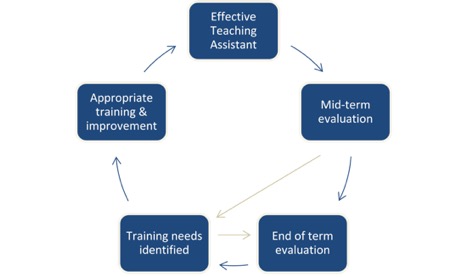Teaching Assistants will generally be evaluated by their students each semester, just as faculty and academic staff are evaluated. These processes differ by department, but frequently take the form of a paper or online survey distributed to students near the end of the semester.
There are other opportunities for evaluation as well, such as informal midterm evaluations created by the program, supervisor, or even by the Teaching Assistant. Midterm teaching evaluations are designed to solicit feedback during the course, so that improvements can be made before the course is over. Midterm evaluations are especially encouraged for new Teaching Assistants who may not have the experience to perceive what might need improvement. Soliciting midterm evaluation shows students that the Teaching Assistant values student input, which can be motivating to students. It also can help teachers detect miscommunication or misunderstanding that might impact the course much later.
Ideally, evaluation will be combined with supervision and additional training in a cycle of continuous improvement. Supervisors can help assistants digest feedback, identify what is already working well and what might be improved, and provide additional training or guidance. The effectiveness of the training strategies can then be assessed at the end of term evaluation, where further training needs may be identified. See Figure 1 below for a diagram of a cycle of evaluation, training, and improvement.

Other forms of teaching evaluation are also valuable. Supervisors or even peers can observe an assistant’s teaching and provide immediate feedback from the perspective of another teacher. UWM’s Center for Excellence in Teaching and Learning also provides consultants who observe classroom teaching. Observations should be followed by meetings to talk over the class observed. Some programs might provide forms for assistants and observers to fill out to help facilitate feedback and guide a later conversation.
Teaching Assistants also should be intentional about observing their own performance. Making brief notes after class about what worked well and what might work better can help them improve steadily and can make periodic meetings with supervisors more productive.
Previous Topic
Next Topic